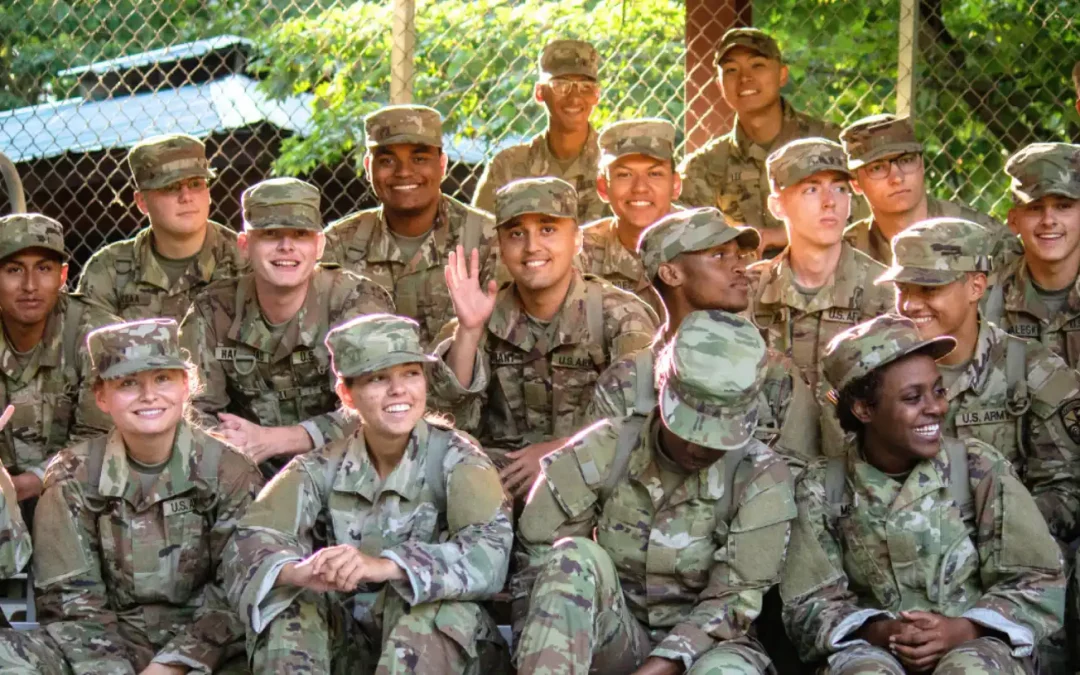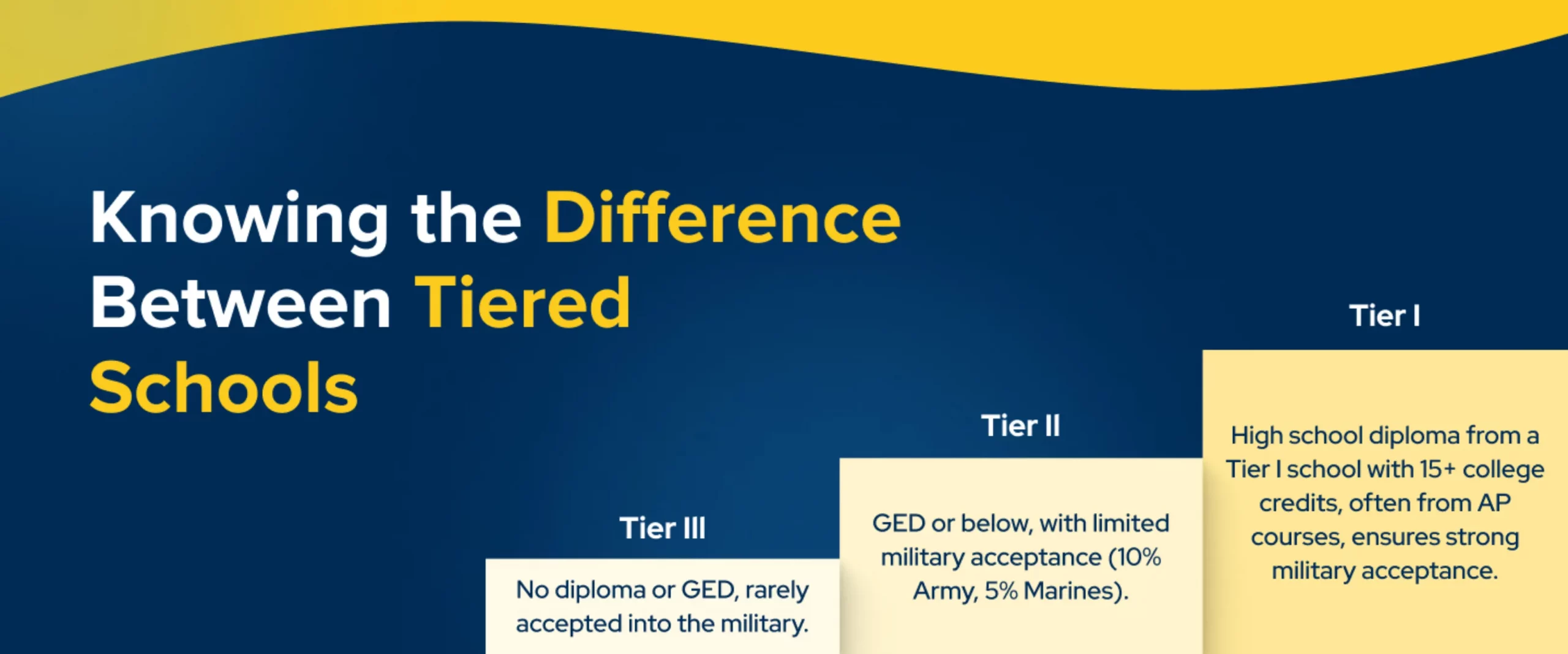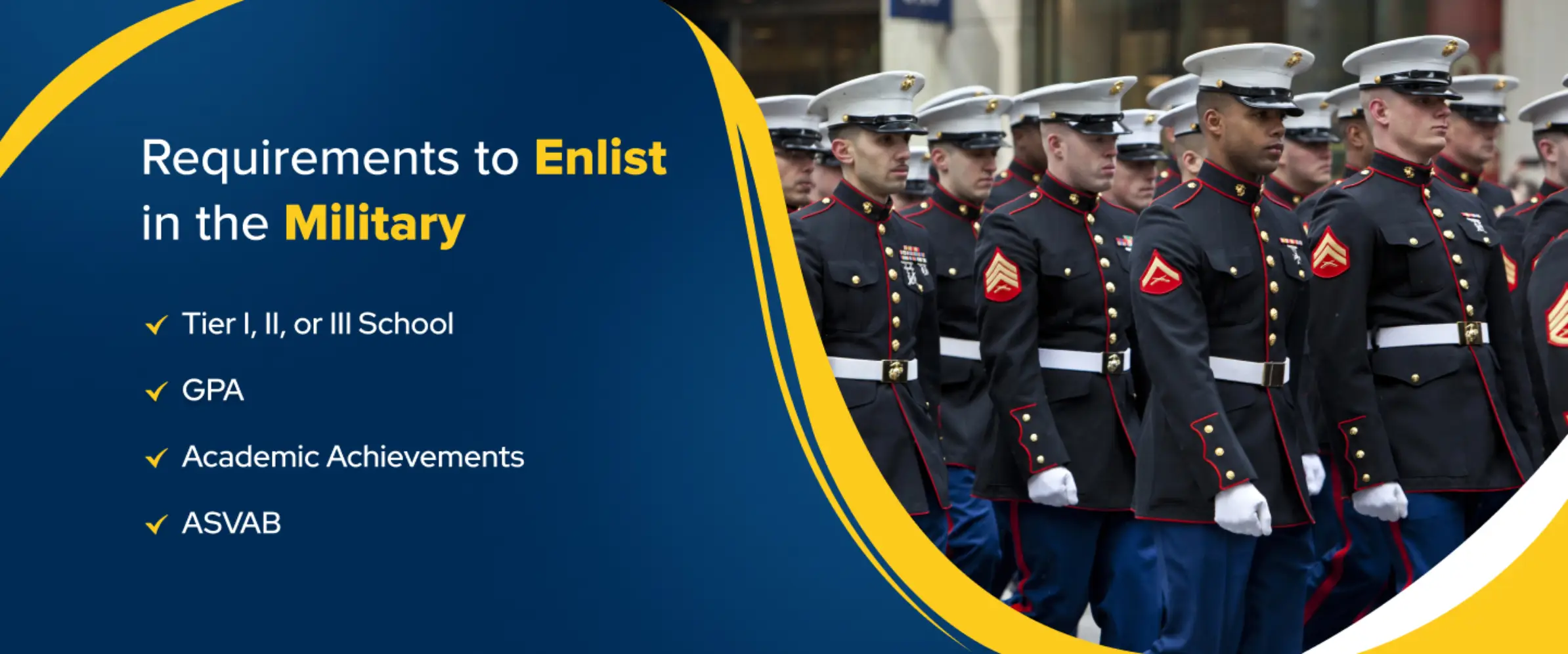Enlisting in the U.S. military is an honorable and respectable way to serve one’s country while acquiring valuable skills. To enlist, candidates must meet criteria for age, fitness, and education. A common question is whether educational requirements can be fulfilled through an online high school? The good news is that the military does accept diplomas from online high schools, as long as the school has passed the Department of Defense review, and is accredited by an agency that is recognized by the military.
In this article, we’ll clarify how an online high school diploma fits into the military enlistment process, address common myths and misconceptions, and outline the requirements and tips for improving the chances of acceptance.
Understanding the Military’s Education Requirements
Getting accepted to the US military is an esteemed achievement that only a small percentage of applicants are awarded. As of 2020, only 23% of Americans ages 17-24 were eligible for enrollment based on 90% of the applicants. It’s a common myth that everyone who wants to enroll in the military gets in. In fact, there are several basic education requirements needed to enlist.
Education Requirements to Enlist in the Military
Academic achievement is one of the primary factors of consideration for enrollment in the military. Students must be in good standing with strong grade point averages (GPAs) in order to be considered. While acceptance is on a case-by-case basis, some of the deciding factors include:
- Tier I, II, or III School
- GPA
- Academic Achievements
- Armed Services Vocational Aptitude Barrier (ASVAB) score
Knowing the Difference Between Tiered Schools
The military uses a 3-tiered system to categorize recruits for enlistment. Tiers are based on the educational institutions from which students come, namely high schools, both online and in-person. Tier 1 students have a high school diploma from a Tier 1 school and a minimum of 15 college credits. These may come from Advanced Placement (AP) courses, which have been approved by the College Board.
Students who graduate from Tier 1 schools such as Acellus Academy are known to have better chances of acceptance in the military due to the higher levels of education they receive.
Tier II applicants are students who may have earned their GEDs or another level of education below a high school diploma. The US Army accepts only about 10% of Tier II recruits and the Marines accepts about 5% of applicants.
Finally, the Tier III applicant pool technically includes recruits without a high school diploma or GED, but applicants from this section are seldom if ever accepted.
Armed Services Vocational Aptitude Barrier (ASVAB) Score
All military applicants must take the Armed Services Vocational Aptitude Barrier (ASVAB) test, regardless of their educational background. This test measures their aptitude for specialty positions within branches of the military.
ASVAB Testing
Each branch of the military sets its own minimum ASVAB score for enlisting. The score you receive will help determine which jobs you’ll be eligible for after you enlist.
There are plenty of ASVAB online resources available that can help students:
- Find out where to take the ASVAB test
- Get tips for taking the test
- See sample questions from the 10 sections
- Better understand ASVAB scores
Enlisting vs. Becoming an Officer: What’s the Difference?
Education plays a significant role in determining whether someone can be an officer or enlisted member in the United States military. Higher education can open doors to more advanced roles and responsibilities within the military.
Enlisted members have different requirements, duties, and commitments than officers, who manage enlisted personnel. As such, skills, functions, and responsibilities vary.
Enlisting in the Military
To enlist in the military, an individual must meet the following requirements:
- Be 17-35 years old
- Be a U.S. citizen or permanent resident alien
- Have a high school diploma or equivalent (online high school diplomas count)
- Be medically and physically fit
- Be in good moral standing
Additionally, high school courses in science, mathematics, physics, computers, and physical education are recommended. It’s also a good idea to take a foreign language, which may expand your job opportunities.
As per USA.gov, the military reserves fewer spots for those with GEDs vs. those with official high school diplomas. If you have a GED, you will have a better chance of joining if you have:
- Earned college credits
- Scored higher on the ASVAB
Commissioning Officers
To join the military as an officer, one can pursue any of the following paths:
Reserve Officers’ Training Corps (ROTC)
The Reserve Officers’ Training Corps is a program that allows students to have a traditional college experience while also taking additional leadership and military courses. Students are given a stipend for tuition, books, and related expenses. Upon graduation, students are commissioned as officers at the rank of Second Lieutenant.
Officer Candidate School (OCS)
Officer Candidate School is a specific training program for prospective officers. This is only available to those who have completed 4-year college degrees.
Military Service Academies
The United States has five service academies and seven senior military colleges. Examples of service academies include the U.S. Military Academy at West Point, the U.S. Naval Academy, and the U.S. Air Force Academy. Graduating from one of these institutions earns cadets a commission as a Second Lieutenant. Senior military colleges, on the other hand, require ROTC participation. The caveat is that there is no service requirement upon graduation unless the student received an ROTC scholarship. These institutions, which are among the most prestigious educational centers in the world, include Texas A&M, The Citadel, the Virginia Military Institute (VMI).
Important things to note about being an officer include:
- Commissioned officers must have a college degree.
- Officer salaries are similar to the salaries of mid-level to senior corporate executives. Benefits of being an officer, however, include major cost-savings for housing, food allowances, tax advantages, and health care.
- Reserve officers can serve while continuing their civilian careers at home.
- Deployment depends on the Military branch chosen and the unit to which you are assigned.
- The commitment length varies from job to job.
Types of High School Diplomas Accepted by the Military
Features of Acellus Academy Online High School
As one of the leading online high schools to send students to the military, Acellus offers a rigorous high school program designed to prepare applicants for future success. Some of our most noteworthy features include:
-
- Tier 1 School Status: As a regionally accredited school, Acellus Academy meets the U.S. Military education enlistment standards for graduates to receive Tier I education status.
- NCAA Approved Courses: This allows student athletes to become eligible to play sports at Division I & II colleges.
- Department of Defense Approval: Acellus Academy has successfully passed the review process of the Department of Defense, and the accreditation is recognized by the military.
Success Stories: Case Studies from Acellus Academy
Numerous Acellus Academy graduates serve in all branches of the U.S. Military, as well as in service academies like the U.S. Naval Academy and West Point. Check out the student spotlights below:
Ray Grant
After graduating from Acellus with a 4.0 GPA, Ray Grant passed his ASVAB (Armed Services Vocational Aptitude Battery) test with a score of 94% and was accepted into Valley Forge Military Academy and College.
Zanai Barnett-Gay
Zanai Barnett-Gay is a recent graduate of Acellus Academy and a basketball athlete whose academic achievements resulted in acceptance into the U.S. Naval Academy.
FAQs About Enlisting With an Online High School Diploma
How does the military view online high school diplomas?
The military does not recognize all accreditation agencies. It’s important that your student earns their online high school diploma from an online school that has passed the Department of Defense review.
Can online high school diplomas meet the military's educational standards?
Yes! Online high school diplomas can and usually do meet the military’s educational standards so long as they are accredited by an agency that the military recognizes.
Do only some branches of the military accept online high school diplomas?
All branches of the military accept online high school diplomas. The rate of acceptance may vary, so it is important to understand how competitive your field of interest is when applying.




The recruiter asked us to submit a form for the school to sign so that she can go to the local Community College GED Program. Is there an Email address or Fax I can send the form to?
Hi Karla, please reach out to info@acellusacademy.com for assistance with your forms.
What branch are you going into?
I am thinking about joining the Marines when I graduate so thank you this helps! 💪
I will be enlisting in the Air Force as a CCT (Combat Control Team) after I graduate at the age of 17. This was really helpful and I wish good luck to others.
Hi, Asher Puska, i’m thinking about going in either the Air Force at some point and wondering if you have any advice on courses on acellus that I could take. Also if you have any suggestion on any tests that I should take before deciding which I would do.
Hi! I do not have much advice for School Courses, but I can give you some advice or ways to boost your chance to be accepted in the Air Force. The number one thing that I think would boost your chances is joining the CAP (Civil Air Patrol) they focus on leadership, Aerospace Engineering, Character Development, Emergency Services and Physical Training. You can even get your private pilots license through them. Even if you don’t want to fly, that’s perfectly OK. They do a lot with search and rescue as well. The benefits from this is that you can say you did CAP and that gives you some ground to stand on. And if you reach the Billy Mitchell Award, which is the rank of 2nd Lt, you will receive an E-3 status when you join the Air Force.(If you don’t know what that is, just say so). If you Enlist of course. Volunteering is another great way to be recognized, if you do enough volunteering hours, you can even be noticed by the state. I don’t have much advice on school, though. I’m currently taking the Tier 1 Highschool Course. I’m not doing any AP classes though. It really depends on what you want to be in the Air Force.
Hello👋 again, Thank you for this information, I was thinking of being either a pilot or working for Emergency Services, also hoping to take some part of my favorite/ future occupation (Acting).
I’m not 100% sure that I want to be in the A.F. but still thinking and wanting to fight and help for my country. If you know anything it would help soooo much please and thank you!!!
Sorry it took so long to reply. . . But being a pilot is an amazing goal, and if you thinking about emergency services, look at SPECOPS SERE. That is the US Air Force Special Warfare, it’s actually not a Special Warfare but it’s still very cool. It stands for Survive Escape and I forgot the last two 🤔But it would still be something to look at.
Hi, my name is Coralynn Puska, I as well am planning on going to the U.S. Air Force Enlisting, or to the U.S Marines, when I turn seventeen. If I get the scoring on the Asvab that I need, I will Enlist in the Air Force as a AMSS, a Aerospace Medical Service Specialist. If not, then I want to Enlist in the Marines as a Dog Handler.